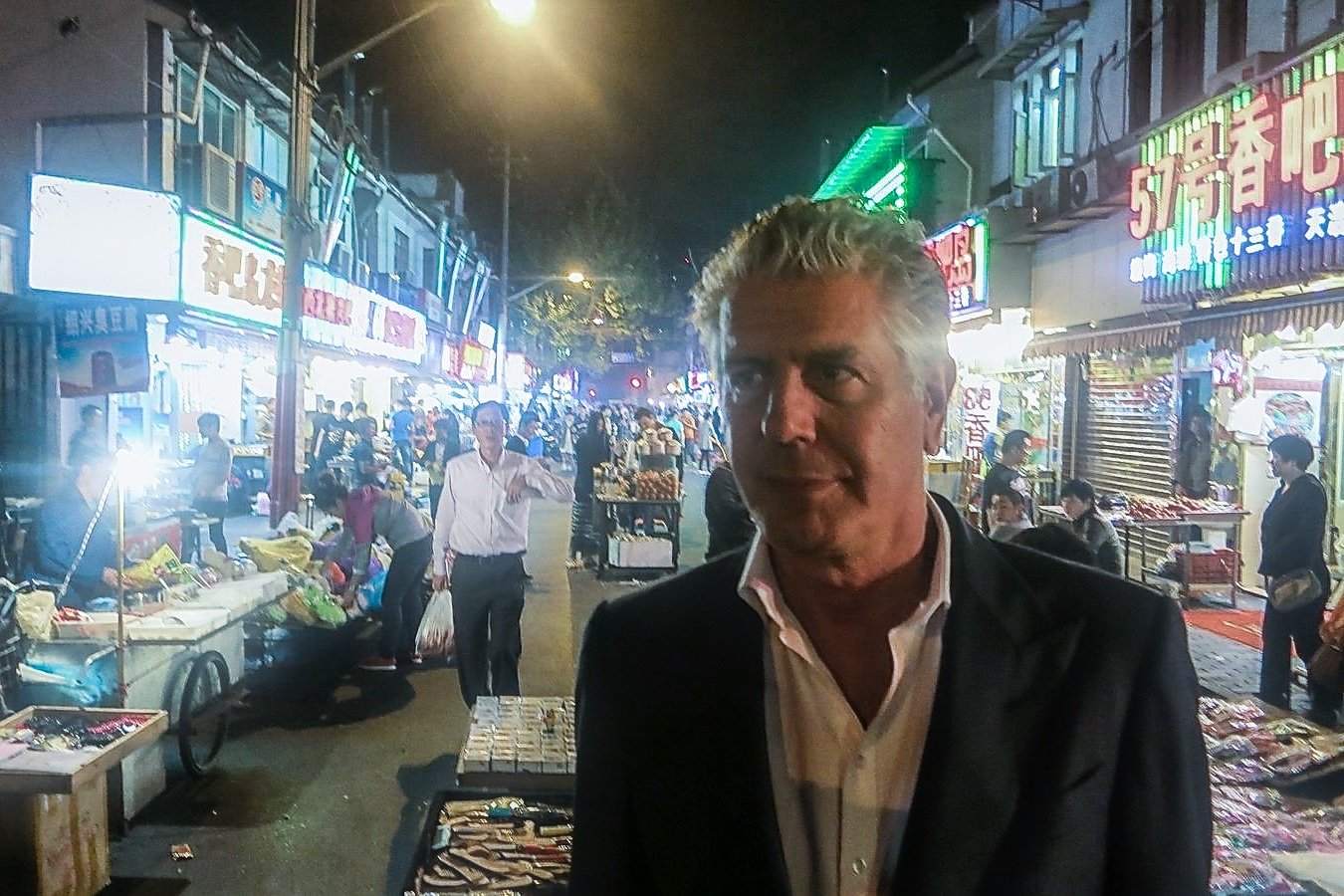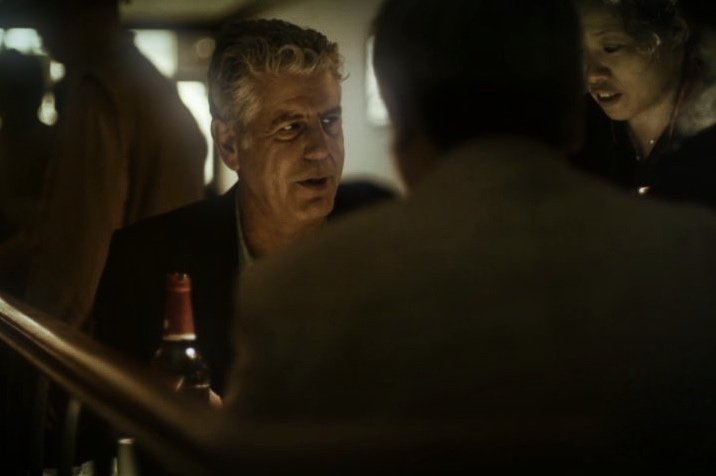“What are our expectations? Which of the things we desire are within reach? If not now, when? And will there be some left for me?” Ten years ago, Anthony Bourdain asked existential questions of the rising economic power that is Shanghai in Parts Unknown’s 4th season opener.
When Anthony Bourdain raised the curtain on Parts Unknown’s fourth season of culinary globetrotting by holding his life’s lens to Shanghai, financial capital of China’s merging of the Old World and New in September 2014, 10 years ago, give or take, the die was cast. Regular CNN News viewers and Bourdain acolytes alike knew what to expect — or at least thought they did.
Hardly anyone would have expected that the season opener’s look at modern China would open, not with Bourdain’s by-now familiar voiceover, acerbic and laden with a sharp, cutting wit, but with a single, spoken musical note, a mezzo-soprano — nǚ gāoyīn — rising into an almost ethereal realm while Bourdain, wearing a coloured pocket square or foulard, made his way through the densely packed nighttime streets of what is now arguably the 21st century’s seat of economic power. Not New York, Bourdain’s hometown. Or London. Or Hong Kong. Shanghai. “This is not, you might have noticed, normal for me,” Bourdain would later admit in his field notes — not in the program itself — for CNN.
Right from the beginning, viewers would have noticed the change. This was going to be a different Bourdain. More reflective. Confident but gracious.
“What are our expectations? Which of the things we desire are within reach? If not now, when? And will there be some left for me?”
Comfortable in the company of outrageous wealth — everyone appreciates a dinner companion who can hold a conversation with style and wit, even those with enough money that they don’t have to care what anyone else thinks — and yet still close to his working-class roots. Here, today, more than five years after his sudden passing, newcomers to the Tao of Bourdain, of which I’m one, are singing his praises on Reddit, Instagram and the other present-day town halls of social media.
“There is a method to my madness,” Bourdain wrote — words that would not make it into the actual show. “These tiny notes of colour are our first venture into actual production design — a calculated effort to give the episode a specific look.”
Shanghai would not be TV. It was cinema. One can only imagine what the business suits inside CNN’s executive offices thought when they first saw Shanghai in its final cut. One doesn’t have to imagine what people in Shanghai, or what the increasingly inscrutable government seat in power in China thought, yesterday or today. By this time, everyone, anyone with a working TV and access to the Internet — which includes virtually all 26.32 million people (2019) of China’s most wired, most socially, economically and politically influential city — knew who Bourdain was.
Back to the episode itself.
Bourdain was a rock star by this point, but he understood, as well as anyone did or could have, that it is about the band, not the frontman.
“I have long been besotted with the works of Chinese director Wong Kar-wai and his frequent cinematographer Christopher Doyle,” Bourdain continued in his Field Notes. “Their films In the Mood for Love and Chungking Express are gorgeous meditations on longing and desire and missed connections. They are spectacularly shot — and a while back I noticed how tiny elements of colour in the foreground of the frames are often connected to similar colours in the background, giving scenes a lush, unified atmosphere that feels natural and undesigned.
“So we tried — as best and as cheaply as possible — to do that. You will notice scenes tied together by colours.
“Cameraman Mo Fallon and cameraman/editor Nick Bridgen did, I think, truly epic work on this one.”
The familiar Parts Unknown signatures are there. The food, for one. Starting with FuChun XiaoLong, where, joined by Professor Zhou Lin, dean of Shanghai Jiao Tong University at the time, Bourdain talked about Chinese economic growth and global geopolitics over steamed soup dumplings and fried pork chops with brown sauce.
Bourdain’s odyssey continued from there to Chun Restaurant, a restaurant with “no menu and no waiting list,” as he described it, “and you only get served if the chef and proprietor knows and/or likes the look of you.”
As the website Eat Like Bourdain posted this past January, the food was served hot and ready: you bao xia (wok-fried whole shrimp with ginger, garlic, salt, and soy), hong shao rou (braised pork belly with cinnamon, sugar, and anise), yan du xian (clay pot soup with bean curd stock, pork belly, tofu, and bamboo), and snail, duck, and fish dishes with rich sweet and soy sauces.
The coup de grace: French oysters in champagne at Shanghai’s Roosevelt Sky Bar as the special guest of Roosevelt China Investments president and CEO Tim Tse, followed by an elegant sitdown meal at Bund 27 and House of Roosevelt with a gathering of some of Shanghai’s more successful and politically connected citizens, among them architect and designer Zeva Wang and real estate developer Daniel Yung.
Crossing over to the other side of the street — literally, as well as figuratively — Bourdain shared a dish of ziran paigu (cumin-rubbed ribs) with hacker-turned-entrepreneur Thomas Yao at Di Shui Dong restaurant. The two talked about freedom on the Internet and the future of technology, dangerous topics to discuss in public, then as now.
Bourdain again:
“I mentioned longing and desire. And in many ways, that’s what this episode is about. China is experiencing an explosive period of change and growth as millions of people are joining the middle class. Millions and millions of people who want and will soon demand the cars, TV screens, apartments, gasoline, access to information, and mobility most of us take for granted.
“China — Shanghai in particular — is a very different-looking place every time I go. And I believe that the world as a whole, largely because of what’s happening in China, will be a very different-looking place. If you live in New York, as I do, and think you live in the most modern, sophisticated city in the world — or even at its centre — Shanghai can come as a rude surprise. In spite of its nominally communist system, it is the most go-go, unfettered, money- and status-mad, materialistic place on Earth. Its skyline alone is confirmation that money talks loudest. In no other city could you build the world’s largest, tallest ominously curved phallus —stick it right up into the clouds like a giant F**K YOU! to the world — and not have trouble with the NIMBYs.”
Oh dear. No one wants trouble with the NIMBYs. Except, of course, when they do.
The thing about Shanghai is, they no longer care. They don’t have to.
Bourdain ended Shanghai as he began it:
“What are our expectations? Which of the things we desire are within reach? If not now, when? And will there be some left for me?”
Nǐhǎo.






